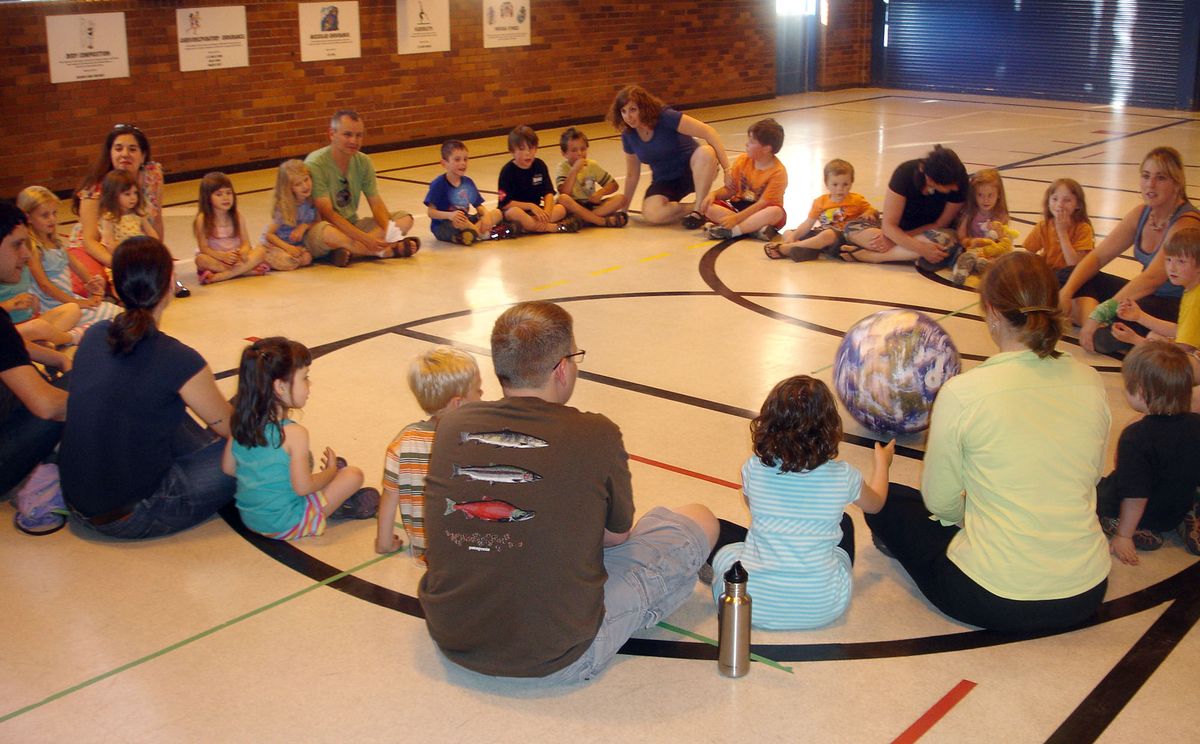Program teaches youngsters to improve society
Earth Scouts uses all-encompassing method

After a brief discussion as they gathered in a circle and passed around a 20-inch inflatable Earth ball, the children and adults in the scouting group stood up to recite their pledge.
“I pledge allegiance to the earth and all the life which it supports. One planet in our care, irreplaceable, with sustenance and respect for all.”
So begins a meeting of the local Earth Scouts, a co-educational scouting program that focuses on cooperative learning in order to promote sustainability, equity and nonviolence.
Earth Scouts is a program of Earth Charter U.S., a loosely knit nonprofit created around a document that expresses the need for human rights, the elimination of poverty, a culture of peace and respect for nature. Earth Charter U.S. provides general guidelines to Earth Scouts groups across the country but allows each troop to create their own place-based, individualized program.
The new Earth Scouts group in Spokane is one of about four in Washington state that have been established in the last few years, according to Genie Skypek, a national coordinator for Earth Scouts. Since the organization doesn’t charge dues, it’s hard to tell how many Earth Scouts groups currently exist, but Skypek knows of at least 40 nationwide. Since Earth Scouts was established in 2002, the nonprofit has received about 800 inquiries, she said. Many of the youths who join are homeschooled, Skypek said, but the groups vary. One troop in Tampa, Fla., for instance, involves at-risk, lower-income kids at a public school.
The Spokane group was started by South Hill resident Russ Posten, a single dad who was seeking opportunities for his 6-year-old daughter, Sophie, to work with other children while deepening her love for the outdoors.
“She’s very gregarious and curious,” said Posten, who often takes Sophie hiking and canoeing. “She really likes to be out in nature.”
He inquired into the possibility of Sophie joining Girl Scouts or Camp Fire, two organizations that he believes have promoted positive experiences for young people. But after some reflection, Posten concluded that an organization such as Earth Scouts would be a better fit for his family.
Posten first learned about Earth Scouts several years ago when he discovered and signed the Earth Charter, a six-page document with a preamble that states: “We stand at a critical moment in Earth’s history, a time when humanity must choose its future. … To move forward we must recognize that in the midst of a magnificent diversity of cultures and life forms we are one human family and one Earth community with a common destiny. … It is imperative that we, the peoples of Earth, declare our responsibility to one another, to the greater community of life, and to future generations.”
Since there were no Earth Scout groups in Spokane, Posten sought advice from Earth Charter U.S. based out of Tampa, Fla., and decided to start one right here.
So far, more than two dozen families have called or e-mailed Posten to learn more about Earth Scouts. Recent meetings have drawn about 20 children, many between the ages of 4 and 7.
“It’s not just a kids’ group, it’s a community group,” Posten said. “Parents are encouraged to stay and participate and kids of all ages work together.”
Instead of simply teaching skills to earn badges, Earth Scouts “addresses issues that are important to creating a sustainable world and taking action in the community,” Skypek said.
Like others who embrace the Earth Charter, Skypek’s definition of sustainability includes human rights, nature, peace, economic justice, democracy and participatory leadership.
“Earth Scouts learn to be participants in civil society,” she said. “My hope is that they develop a passion for knowing how to take action to generate improvement and to gain the positive experience of creating change.”
During the first gathering of Earth Scouts in Spokane about a month ago, the families engaged in a game called “recycle freeze.” While music played in the background, children played in huge piles of “trash.” Kids were then encouraged to explore the objects in front of them and figure out whether or not they were recyclable. After making a mess, they sat down and discussed the impact of trash in their homes, schools, parks and other places in the community. Then after separating the recyclables, they cleaned up.
Posten and other parents want to promote the principles of the Earth Charter by getting children involved in dialogue, games, arts and crafts, music, science projects and field trips such as the hike they recently organized at Indian Canyon Waterfalls, located just west of downtown Spokane.
Before walking along the trail, the 15 kids and their parents gathered in a circle discussed the area’s fragile ecosystem and the responsibility of people who spend time in nature. As they hiked along the mile-long trail, they picked up garbage keeping in mind the policy of “Leave no trace.”
The national Earth Scouts Web site provides many examples for scouting groups. For instance, if a troop were to tackle one of the Earth Charter principles of eradicating poverty, the Web site encourages youths to consider several courses that include learning the difference between organic and non-organic farming; learning about discrimination against migrant farmers in their community; and making an effort to buy locally produced food.
But since the national Earth Scouts group only provides guidelines, Posten and other parents must now put together a curriculum and make plans for each meeting.
“The best place to start is with the children and ourselves as we interact with our children,” said Posten, a Spokane native who returned to his hometown in 2003. “We also use the Earth Charter and its focus on democracy, peace, social justice, respect and thinking of how we care for our communities.”